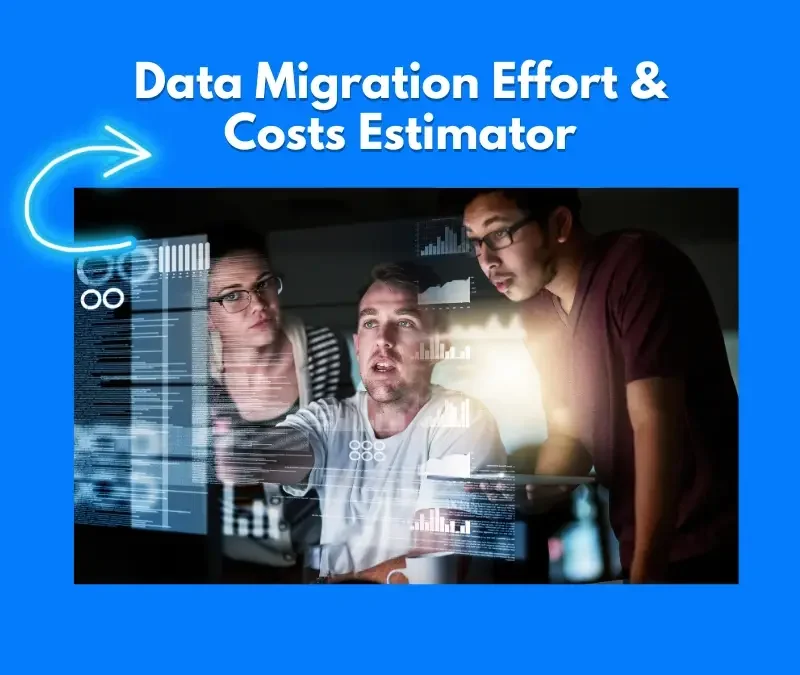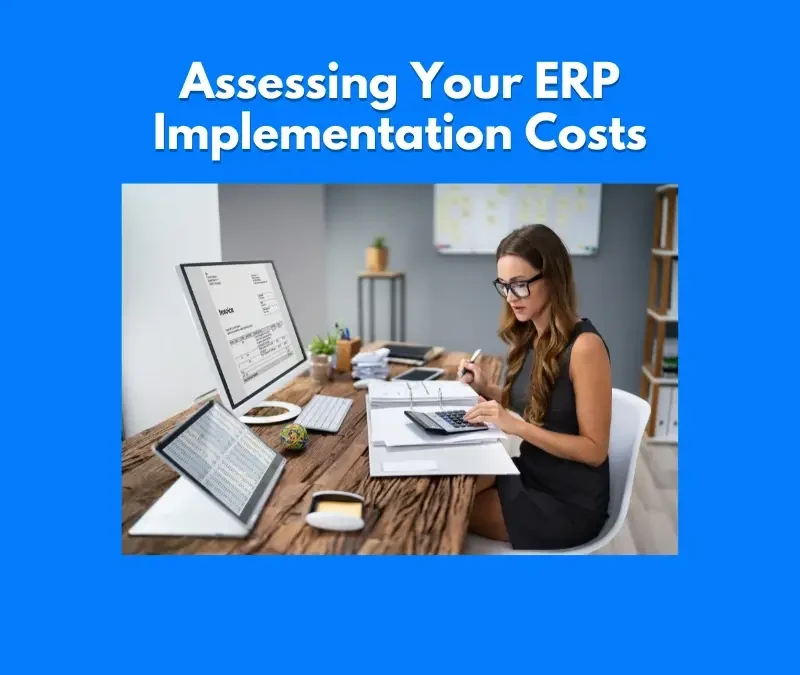ERP Implementation Cost Calculator Online
I’ve worked on ERP projects for 24+ years and seen most companies guess wrong about costs. The ERP Implementation Cost Calculator shows you the approximate costs and their drivers, before you start. It includes all the costs that sales people don’t tell you about.
The tool shows what you’ll spend on software, customization (always more than you think), training your staff, moving your old data, and keeping the system running. These hidden costs often double or triple the initial budget.
I created this after watching a client spend their entire IT budget on just the first part of their project. They were shocked by the real costs. This calculator helps you make better choices about what you actually need versus what sounds nice to have.
Whether you’re a small company buying your first system or a large business replacing old software, this tool helps you plan with real numbers. My clients tell me they feel much more confident in budget meetings when they use it.
What is the ERP Implementation Cost Calculator?
The ERP Implementation Cost Calculator helps businesses estimate all costs associated with implementing an ERP system. By providing detailed cost breakdowns, it simplifies financial planning for any organization.

How to Use the ERP Implementation Cost Calculator
Our calculator helps you find out what your new system will really cost. Follow these simple steps:
- How many employees do you have?: This tells us how many people will use the system and affects your license costs.
- Which parts do you need?: Pick what your business needs:
- Financial Accounting and Controlling
- Human Resources
- Procurement
- Manufacturing
- Analytics
- Advanced Finance
- Sales and Distribution
- Customer Relationship Management
- Quality Management
- What’s your industry?: Tell us if you’re in Manufacturing, Retail, Healthcare, or something else. Each industry has different needs.
- Which system do you want?: Like SAP S/4HANA Cloud. Cloud systems have monthly fees while on-premise has bigger upfront costs.
- What country are you in?: Costs change based on your location due to local rules and rates.
- How many companies need this?: More companies mean more work to set up and transfer data.
- How far ahead do you want to plan?: 1 year, 3 years, 5 years, to help with your budget planning.
After you answer these questions, you’ll see what your ERP system will likely cost. This helps you plan your budget and avoid those nasty surprise expenses that so many companies face.

The Formula for the ERP Implementation Cost Calculator
The ERP Implementation Cost Calculator uses a clear formula:
Implementation Cost = (Licensing Cost × User Count) + Customization + Training + Maintenance Fees
This formula considers both fixed and variable costs for accurate results. This tool helps organizations plan ERP projects by estimating costs associated with software, implementation, and ongoing support. It reduces the uncertainty of budgeting for ERP systems.
Who Can Use the ERP Implementation Cost Calculator?
If you’re planning an ERP project, this Cost Calculator is built for you. I designed it after watching dozens of companies get blindsided by unexpected costs halfway through implementation. Over my 15 years leading these projects, I’ve seen the same pattern: companies budget for software but forget the hidden costs that often double or triple the final price tag. This tool helps you see the complete picture before you commit.
Business Owners and Executives:
Gain insight into the financial commitment required for an ERP system, helping make informed decisions on budget allocations.
IT and Project Managers:
Use the calculator to estimate costs for ERP implementation, customization, and ongoing maintenance, allowing for accurate project planning and resource management.
Finance and Budgeting Teams:
Understand the cost breakdown of ERP components, including licensing, training, and support, to ensure financial feasibility and compliance with budget constraints.
Consultants and Advisors:
Quickly estimate ERP implementation costs for clients across different industries and regions, providing transparent cost projections in client proposals.
Small, Medium, and Large Enterprises:
The calculator adapts to businesses of all sizes, helping SMBs and large corporations alike plan their ERP budgets based on specific requirements.
This tool is invaluable for anyone involved in ERP planning, ensuring that cost considerations are clear and comprehensive for smoother decision-making and implementation readiness.
Which Industries Can Use It?
Industries that rely on ERP systems for operations include:
- Manufacturing
- Retail
- Healthcare
- Logistics
- Finance
These industries rely on ERP systems for streamlining processes and tracking resources.

Benefits of Using the ERP Implementation Cost Calculator
Thinking about implementing an ERP system but unsure about the costs? Here’s how the ERP Implementation Cost Calculator can make your life easier:
Clear Cost Estimates:
Forget the guesswork! This calculator breaks down expenses—licensing, customization, training, and more—giving you a realistic view of what you’ll spend upfront and over time.
Saves You Time:
No need to dig through spreadsheets or consult multiple sources. Just input your details, and the calculator does the heavy lifting, offering you a complete estimate in seconds.
Customizable for Your Business Needs:
Every business is unique, and so are its ERP needs. You can select specific modules, industry requirements, and company size, so the estimate reflects what’s relevant to your operations.
Better Budget Planning:
Knowing the costs in advance helps you plan your budget with confidence. With this calculator, you’re equipped to allocate resources wisely and avoid financial surprises down the line.
Supports Informed Decision-Making:
When you have a clear picture of the costs, it’s easier to make decisions on the ERP solution that’s right for you, whether that’s a cloud or on-premise option, and to understand the long-term investment involved.
Using the ERP Implementation Cost Calculator gives you a straightforward, reliable way to approach ERP budgeting—so you can focus on the big picture without getting bogged down by financial uncertainties.
How Can SAP Negotiation Advisors Help Manage Costs?
Working with SAP negotiation advisors, like me, can make a significant difference in how your ERP costs are structured and managed. Many businesses enter SAP contracts without fully understanding the pricing models, licensing structures, and potential cost-saving opportunities. Having an advisor on your side ensures that you’re not overpaying for services or committing to unnecessary modules and features.
With my experience, I help businesses:
Optimize Licensing Agreements:
SAP licensing can be complex, with different models for cloud and on-premise deployments. I work to align your licensing needs with your actual business requirements, ensuring you don’t pay for features you won’t use.
Negotiate Favorable Terms:
Vendors often have flexibility in pricing and contract terms. I leverage industry insights and benchmarking data to secure the best possible deals, whether it's upfront costs, renewal terms, or additional services.
Identify Hidden Costs:
Many businesses underestimate expenses related to customization, integrations, and long-term support. I help uncover these hidden costs early, allowing you to budget accurately and avoid surprises.
Ensure Scalability and Flexibility:
Business needs evolve, and it's essential to have an agreement that allows for growth without excessive penalties. I help structure contracts that support future expansion while controlling costs.
Avoid Vendor Lock-in:
Many organizations unknowingly commit to long-term contracts with limited flexibility. I help you negotiate terms that provide room for changes and avoid unnecessary restrictions.
Partnering with an SAP negotiation advisor ensures that your ERP investment delivers the best value while staying within budget. Want to know more? Visit my website for insights.
What ERP Systems Really Cost? My Perspective
I’ve seen companies shocked by their final ERP bill for over 15 years now. Let me give you the real numbers that vendors won’t tell you upfront:
Most companies end up spending between 1% to 5% of their yearly revenue on ERP. Your exact price tag depends on your size, what industry you’re in, and how messy your current processes are.
Small businesses typically shell out between $150,000 and $750,000. They usually stick to the basics and avoid fancy customizations.
Mid-sized companies? They’re looking at $1 million to $5 million. They need more bells and whistles to handle their growing pains.
Large corporations blow past $10 million without blinking, especially if they’re spread across multiple countries. They get hit hardest because of regulatory hoops, moving mountains of old data, and their complex workflows.
Your industry matters a ton too. I’ve watched manufacturing companies pay through the nose because of inventory and production tracking needs. One logistics client of mine had to spend an extra $500,000 just to connect their ERP to their truck tracking systems.
Here’s the typical cost breakdown I see:
- Software licenses: 20-30% (the part vendors focus on)
- Consulting and implementation: 30-50% (the part vendors downplay)
- Customization, training, and support: The rest
- Yearly maintenance: 5-10% of your total costs each year (the gift that keeps on giving)
I’ve noticed that companies who really nail down their requirements and resist the urge to customize everything spend way less. And your choice between cloud or on-premise is huge. Cloud systems won’t crush your budget upfront but they’ll nickel and dime you forever. On-premise systems hit your wallet hard initially but give you more control over the long haul.
Want to see what your company would actually pay? Give our calculator a spin or drop me a line directly.

What Does Gartner Say About ERP Implementation Costs?
Gartner estimates that ERP implementation costs typically range between 1% to 5% of a company’s annual revenue, depending on the complexity and scale of the project. The total investment includes both direct and indirect costs that businesses need to plan for carefully.
Key cost components include:
- Software Licensing: Covers the cost of ERP software, with cloud-based solutions offering flexible pricing compared to on-premise deployments.
- Implementation Services: Consulting, configuration, and project management can take up a significant portion of the budget, especially for complex global rollouts.
- Customization and Integrations: Tailoring the ERP to fit specific business needs and integrating it with existing systems can drive costs higher.
- Training and Change Management: Investing in employee training ensures a smoother transition and maximizes ROI.
- Ongoing Support and Upgrades: Businesses should account for recurring costs related to maintenance, system updates, and scalability adjustments.
Based on my experience, companies that clearly define their ERP goals and actively manage scope tend to control costs more effectively. Proper planning and stakeholder involvement are key to avoiding budget overruns.
For more insights and cost planning strategies, visit my website.
ERP Implementation Cost Breakdown
I’ve led ERP projects for 24+ years, and let me tell you… companies are always shocked by the final bill. Here’s what you’ll actually pay:
Most companies spend between 1% to 5% of their yearly revenue on ERP implementation. Where you land depends on your size, industry, and how messy your current systems are.
Here’s how those costs typically break down:
- Software Licensing (20-30%) – This is just the price of admission. One manufacturing client paid double what they expected because they needed special production planning features.
- Implementation and Consulting (30-50%) – The biggest chunk. A retail client with 50 stores needed consultants at each location, blowing past their budget by 40%.
- Customization (10-20%) – Every time you say “our business is unique,” add money here. A bank I worked with spent $800,000 just on compliance customizations they didn’t plan for.
- Data Migration (10-15%) – Moving your old data is like moving houses – you never know what’s hiding in the attic. A healthcare provider discovered 15 years of duplicate patient records that took months to clean up.
- Training (10-15%) – People hate change. Proper training costs more than you think. A logistics company had to retrain their entire warehouse staff twice because they cut corners the first time.
- Support and Maintenance (5-10%) – The gift that keeps on giving, year after year.
Companies that plan carefully and resist the urge to customize everything spend way less. And your cloud vs. on-premise choice makes a huge difference – cloud costs less upfront but adds up over time.
Want to get specific numbers for your business? Check out our calculator.
Frequently Asked Questions
I receive many questions from clients about SAP implementation, chances are, you might have the same ones.
Here are answers to the most common concerns, covering everything from timelines and costs to post-go-live support. Let’s make your SAP journey smoother and more effective.
1. What is the ERP Implementation Cost Calculator?
The ERP Implementation Cost Calculator is a tool that helps businesses estimate the initial costs of your ERP implementation. This cost projection supports building a business case by outlining expenses related to software, consulting, training, and support.
2. How accurate are the cost estimates provided by the calculator?
The estimates are based on general industry standards and common cost components in ERP implementations. While it provides a solid foundation for initial budgeting, the final costs may vary depending on specific project requirements and vendor rates.
3. What factors does the calculator consider for ERP implementation costs?
The calculator includes several cost factors, such as software licensing, consulting services, configuration, training, and ongoing support. Each factor is adjusted based on inputs like project scale, user count, and level of customization.
4. Can I use the calculator for different ERP modules?
Yes, the calculator is flexible enough to estimate costs across various ERP modules, such as Finance, Procurement, and HR. You can select or input relevant details specific to your required modules for more accurate estimates.
5. How does the calculator handle customization costs?
The calculator includes an option to estimate costs for customizations, based on the level of customization needed. Customization increases costs due to additional consulting and development work, which is reflected in the calculation.
6. Can I use the cost estimate for my business case presentation?
Yes, the cost estimate provided by this calculator is designed to help you build a business case by offering a clear projection of initial ERP implementation expenses. This information can be used to justify investment and secure budget approval.
7. Does the calculator provide ongoing support costs as well?
Yes, it provides an initial estimate of ongoing support costs, which includes software maintenance and help desk support, typically incurred post-implementation. This ensures a more comprehensive view of long-term costs.
8. Are training and documentation costs included in the estimate?
Yes, the calculator includes costs for user training and documentation as part of the initial implementation budget, as these are crucial for a successful project rollout.
9. Can this calculator be used for projects of different sizes?
Absolutely. The calculator is adaptable for both small and large projects. Simply enter the relevant details, like project scale and user count, to get an estimate that matches your project size.
10. Is this cost calculator free to use?
Yes, the ERP Implementation Cost Calculator is available for free to help businesses get a preliminary cost estimate and make informed decisions about their ERP project.
Support Resources
Our support resources are designed to simplify your ERP implementation journey, specifically for SAP. With insights, tools, and templates, these resources ensure each stage of your project runs smoothly and efficiently.
Key Resources
SAP Implementation
Get started with our in-depth guide, How to Start Your SAP Implementation Project Right, which provides foundational steps for a successful implementation.
SAP Implementation Timeline & Planning
Planning is crucial. Visit our 2024 SAP Timeline & Planning Implementation Guide to align your project goals with a structured timeline.
Best SAP Project Tracking Tools
Monitor project progress with our recommended tracking tools in the 5 Best SAP Project Tracking Tool Guide 2025.</b
Implementation Templates
For streamlined execution, use templates discussed in Best Implementation Templates using SAP Activate in 2024.
Change Management Tools
Handle technical changes effectively with the right tools. Our article, The 3 Best SAP Technical Change Management Tools in 2024, covers solutions to manage change seamlessly.
SAP Documentation Tools
Document every step of your implementation for future reference with guidance from our article, 15 Best SAP Documentation Tools for Project Success in 2024.
SAP ERP Consultant Support
Read about my experience as an SAP ERP Consultant: My Journey and Lessons Learned to understand the real-world challenges and solutions in SAP consulting.
AI Insights for SAP
Discover how our AI Insights can enhance your ERP implementation. Check out our tools to support your ERP journey.
SAP Implementation Cost Calculator
Estimate the initial investment with our SAP Implementation Cost Calculator, specifically designed to support your business case.
ERP Support
Need assistance? For ERP Support, Contact Noel D'Costa, where you’ll get guidance for each phase of the SAP implementation process.
Additional Guides
- System Implementation of SAP: Explore our comprehensive approach in System Implementation of SAP and How I Help.
- SAP Solution Builder: Essential SAP Solution Builder: Find Your Industry BOM, helping you customize SAP solutions for industry-specific needs.
These resources cover the essentials of SAP implementation, providing practical advice and tools to optimize your ERP project from start to finish.
Plan Your SAP Project Better with My AI Tools
I’ve led SAP projects for 20 years and built planning tools based on what actually works. These tools solve real problems I’ve seen in dozens of implementations.
My tools help you:
- Figure out how long data migration will take
- Build a business case with real numbers
- Create timelines that work in the real world
- Estimate actual costs, not fantasy numbers
These tools aren’t magic, but they’re much better than guessing. They use patterns from hundreds of past projects to give you realistic estimates. If you’re tired of SAP surprises and want a plan you can trust, try these tools. They won’t do the work for you, but they’ll help you avoid the biggest mistakes I’ve seen over two decades.






